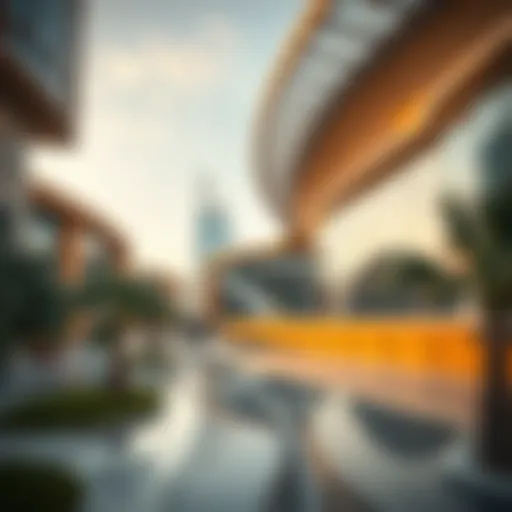Exploring Dubai's Residential Properties for Sale


Intro
Dubai's residential property scene is nothing short of captivating. As one of the most dynamic markets in the world, it offers a smorgasbord of options for buyers, investors, and developers alike. From towering skyscrapers that scrape the sky to quaint villas adorned with character, each nook and cranny of this vibrant city holds promise. With a culture that encourages innovation and a legal framework designed to facilitate foreign ownership, Dubai is an alluring choice for those seeking new opportunities in the real estate sector.
At the heart of this expedition is a need to understand not just the surface level of property types, but the intricate tapestry that makes up market trends, financing options, and future forecasts. We'll piece together critical insights that will aid prospective home buyers and investors to navigate the otherwise complex landscape of property acquisition in Dubai.
The information we present will serve as a compass, shedding light on market dynamics while addressing common concerns that often cloud decision-making processes. High-stakes investments demand attention to detail; thus, this guide promises to offer a nuanced narrative that enriches your perspective on Dubai's residential properties.
So, whether you're looking to plant roots or seeking a sound investment, buckle up. We're about to dive deep into the expanse of residential properties on offer in this dazzling gem of the Middle East.
An Overview of the Dubai Real Estate Market
When discussing real estate, Dubai often tops the list due to its rapidly evolving landscape and remarkable growth. Understanding its market is crucial for anyone considering a property investment or purchase. This overview is not just about numbers or flashy buildings; it helps illuminate paths for potential buyers and investors alike.
The Dubai real estate market is like a double-edged sword, it offers both challenges and opportunities. At its core, it presents an array of residential properties, from luxurious villas nestled by the sea to modern apartments in high-rise buildings.
Historical Context
Dubai's real estate journey is fascinating and layered with ups and downs. Its transformation from a modest fishing village into a global hub for trade and tourism is remarkable. Back in the 1990s, with the introduction of foreign property ownership laws, the market saw its first significant surge. Fast forward to the 2008 financial crisis, the market experienced a notable downturn. Yet, it emerged with newfound resilience, leading to the current expansive landscape we see today.
Today, developers are unveiling ambitious projects with innovative designs like the Burj Khalifa and The Palm Jumeirah. These projects have not only reshaped the city skyline but also attracted global investors, adding complexity to the marketplace.
Current Market Trends
As of late 2023, the Dubai property market is witnessing several intriguing trends:
- Increased Demand for Affordable Housing: There’s been a noticeable shift towards mid-priced properties. Many first-time buyers and expatriates are looking for affordability without compromising on quality.
- Focus on Sustainability: Eco-friendly developments are becoming a norm, as both developers and buyers lean toward sustainable living options. This aligns with global initiatives, emphasizing energy efficiency and environmental responsibility.
- Technological Integration: The incorporation of smart home technology is rising in residential spaces, enhancing comfort and security for buyers.
- Regulatory Changes: New laws and adjustments in ownership regulations are introducing more transparency which is critical for foreign investors.
Real estate experts are eyeing these trends closely, as they provide insight into future developments. For instance, the increased demand for luxury rentals signals a robust market for short-term investments.
"The Dubai real estate market is a dynamic beast, always adapting to the economic landscape and buyer demands. To thrive here, one must be astute and informed." - Real Estate Analyst
Understanding these currents in the market is essential for stakeholders to make informed decisions. With the ongoing global economic factors influencing trends, it's prudent to keep a finger on the pulse of this ever-changing environment.
Types of Properties Available
Understanding the types of residential properties available is crucial for anyone looking to invest or buy a home in Dubai. The real estate landscape here is diverse, catering to various lifestyles, budgets, and preferences. Knowing what’s on the table helps buyers align their desires with their financial capabilities and lifestyle choices.
Additionally, the variance in property types influences the overall market trends, investment potential, and returns on investment. Among the most sought-after options are residential apartments, villas, townhouses, and luxury properties. Each type serves a distinct segment of buyers, and understanding these distinctions can empower informed decision-making in this dynamic market.
Residential Apartments
Residential apartments in Dubai cater predominantly to expats and young professionals who seek convenience and accessibility. These properties typically reside in bustling urban areas, offering easy access to cafes, shopping centers, and public transport. With a range of options from studios to multiple-bedroom apartments, these residences provide flexibility for different family sizes and living arrangements.
"In the heart of Dubai, you’ll find apartments that blend comfort with a vibrant lifestyle, making them perfect for those on the go."
When considering residential apartments, factors such as location and amenities come into play. Many buildings feature shared facilities including pools, gyms, and even children’s play areas, which enhance the living experience. However, it’s important to remember that living in an apartment can come with community rules and monthly service charges, which are aspects to discuss prior to purchase.
Villas and Townhouses
Villas and townhouses present a more spacious option for families and those who appreciate privacy and outdoor space. They typically sit in quieter neighborhoods, providing a stark contrast to the bustling lifestyle of apartment living. Buyers often seek villas for their expansive gardens, private pools, and the overall sense of luxury they offer.
The market for villas involves different styles, including contemporary and traditional Arabian designs. This variety allows buyers to choose based on their personal aesthetic and living needs. However, owning a villa means more upkeep; from gardening to maintenance of swimming pools, it's essential to factor in these responsibilities into the buying decision.
Furthermore, living in a townhouse can offer a middle-ground solution, balancing space while still providing some sense of community, often having shared facilities similar to apartments.
Luxury Properties
Dubai is renowned for its luxury properties, attracting wealthy buyers from around the globe. These homes and apartments are often featured in prestigious locations like Palm Jumeirah or Downtown Dubai, boasting unparalleled views and high-end amenities. The allure of luxury properties extends beyond mere aesthetics; they represent a lifestyle of opulence and exclusivity.
Investors considering luxury real estate can expect premium developments that focus on bespoke designs, advanced technology, and superior materials. However, potential buyers should be aware of the price point that accompanies such lavish offerings, as well as the fluctuating market conditions affecting luxury properties. Investing in this sector can yield substantial returns, but thorough research and consideration are paramount.
Understanding the Home Buying Process
Navigating the home buying process in Dubai requires a detailed understanding of various steps involved. This segment is crucial because it helps both first-time homebuyers and seasoned investors to make informed decisions. By comprehensively grasping the home buying procedures, individuals can avoid potential pitfalls, save time, and secure the property that suits their needs best.
Initial Research
The journey begins with thorough research; it’s absolutely essential. The Dubai real estate market, while vibrant and attractive, can also be complex. Begin by exploring different neighborhoods, property types, and price ranges. Websites like Dubizzle and Bayut offer listings that can be helpful.
Here are some specific aspects to consider during your research:
- Property Type: Do you want an apartment, villa, or a townhouse? Each has its unique pros and cons.
- Location: The vibe in Downtown Dubai is entirely different from something in Dubai Marina. Consider proximity to work, schools, or parks.
- Market Trends: Are prices rising or falling? Analyzing trends can assist you in timing your purchase wisely.
Taking time to research can pay dividends. Knowledge is power, especially in such a bustling market.
Engaging a Real Estate Agent
Working with a real estate agent can make life a lot easier. Think of it as having a guide through the maze of real estate transactions. An experienced agent brings a wealth of knowledge and professional connections that can be invaluable. Here are some points to ponder when choosing an agent:
- Experience: Look for a professional who understands the market in Dubai and has successfully closed deals, especially ones similar to what you're seeking.
- Reputation: Recommendations and reviews can give a good indication of their trustworthiness. Check out platforms like Facebook or LinkedIn.
- Communication: Ensure that the agent listens to your needs and preferences, and is proactive in providing options that suit you.
Having the right agent can not only streamline the process but also help you find unique opportunities that might evade casual buyers.
Virtual Tours and Open Houses
In an age where technology reigns, virtual tours and open houses have become more than just a trend; they’re a necessity. Virtual tours allow you to explore multiple properties without leaving your home. It’s like having a personal showing at your fingertips. When attending open houses, pay close attention to:
- Layout and Space: Is the space functional for your lifestyle? Imagine placing your furniture there.
- Quality of the Build: Look beyond aesthetics. Check out materials and finishes; they can tell you a lot about property value and maintenance.
- Neighborhood Feel: While inside the house, don’t forget to take a stroll outside. The atmosphere and neighbor interactions can wisely influence your decision.


Visiting properties both virtually and physically allows you to gather more insights, significantly aiding in making thoughtful decisions. Remember, buying a home is not just a transaction; it’s about finding a space where life unfolds.
Conducting proper research, engaging a skilled agent, and utilizing tech tools like virtual tours and open houses can transform your buying experience from overwhelming to streamlined.
Financing Options for Home Buyers
Navigating the Dubai real estate landscape takes a decent understanding of the energies within the financial aspect. Financing options are crucial for prospective buyers who wish to secure a property. Choosing the right financing method can significantly impact your purchasing power, budget, and overall experience in the market. With various choices available, it’s essential to weigh the advantages and disadvantages of each before making a commitment.
Mortgages
Mortgages serve as traditional, yet powerful means for many buyers looking to purchase a home in Dubai. Generally, a mortgage allows you to borrow a substantial amount of money, which is then repaid with interest over a set period. Here’s how it works:
- Down Payment: Typically, buyers are required to make a down payment ranging from 20% to 25% of the property's value.
- Interest Rates: Rates vary significantly depending on the lender, your credit, and the specific mortgage product.
- Repayment Terms: Mortgages usually come with flexible terms, often between 15 to 30 years.
Pros: Obtaining a mortgage can make owning property achievable for those who may not have the full amount available. It also helps in accumulating equity over time.
Cons: However, potential pitfalls include fluctuating interest rates and the long-term financial commitment that comes with borrowing a large sum. Not all loans may be comparable to your needs or financial situation.
Cash Purchases
On the other hand, purchasing property with cash can provide a much clearer path without the strings attached to loans. Buyers opting for cash transactions can enjoy various benefits:
- No Interest: Buying outright negates the burden of monthly repayments and interest-related costs.
- Bargaining Power: Cash buyers often hold leverage in negotiations, as sellers favor quicker, less complicated deals.
- Simplicity: The absence of mortgage paperwork cuts down the time and stress of the purchasing journey.
Despite these advantages, purchasing a home outright is not feasible for everyone. Many buyers may not have access to such liquid assets or might prefer to invest their capital elsewhere rather than tying it up in real estate.
Alternative Financing Solutions
Lastly, alternative financing solutions are gaining popularity among potential buyers looking for options outside traditional mortgages and cash purchases. These solutions may include:
- Shared Ownership: This option lets buyers purchase a share of a property and pay rent on the remainder, appealing particularly to first-time buyers.
- Equity Release: Homeowners might consider equity release schemes to tap into the value of their existing homes to fund a new purchase.
- Crowdfunding: Some platforms allow multiple investors to pool resources for real estate purchasing, providing an entry point for those with limited individual capital.
Evaluating Neighborhoods
Evaluating neighborhoods is a crucial step when diving into Dubai's bustling real estate scene. For potential homeowners and investors, understanding the neighborhood dynamics can shape not only the ease of life but also the value appreciation of the property over time. With many diverse districts in Dubai, each offering unique vibes and facilities, making an informed choice can lead to better living experiences and more astute investments.
Key factors to consider when evaluating neighborhoods include proximity to work or school, safety, community atmosphere, and future development potential. In a city as diverse as Dubai, these components can greatly impact one’s quality of life.
Popular Areas for Expats
In Dubai, some neighborhoods have an established reputation as strongholds for expatriates. Areas like Dubai Marina, Jumeirah Beach Residence (JBR), and Downtown Dubai are not merely high-profile but also offer a blend of lifestyle and accessibility. Here, expats find a wealth of dining options, retail spaces, and recreational activities.
- Dubai Marina is celebrated for its waterfront living. Its promenades and nightlife create a vibrant atmosphere, attracting young professionals and families alike.
- JBR provides direct beach access paired with a bustling atmosphere filled with cafes and shops. It’s ideal for those who enjoy the sun and surf.
- Downtown Dubai, home to landmarks like the Burj Khalifa and Dubai Mall, is central and immensely popular, making it a hub for those who like being in the thick of the action.
Choosing a neighborhood that aligns with personal lifestyle preferences can contribute immensely to satisfaction and wellbeing while living in Dubai.
Emerging Neighborhoods
While established neighborhoods draw many, it's wise to keep an eye on emerging areas that show potential for growth. Locations like Dubai South, Dubai Creek Harbour, and Al Furjan exemplify this growth phenomenon.
- Dubai South is an ambitious project intended to serve as a commercial and residential ecosystem, appealing to investors seeking potential appreciation.
- Dubai Creek Harbour is designed as a coveted locale with sustainable living at its core. Its vision integrates lush landscapes and modern architecture, enticing families seeking a serene environment.
- Al Furjan is thriving with new developments, providing a mix of townhouses and villas that offer more space at a competitive price. This neighborhood embodies community living, attractive to both families and young professionals looking for their first home.
These emerging neighborhoods not only promise potential returns but also offer unique lifestyles that reflect the future direction of Dubai’s development.
Access to Amenities
Another cornerstone in evaluating neighborhoods is the access to essential amenities. In a modern city, the convenience of day-to-day life can significantly affect one’s living experience. Key amenities to keep in mind include public transport, schools, hospitals, and recreational facilities.
- Proximity to Dubai Metro stations fosters convenience, preventing lengthy commutes. Notable examples include areas surrounding the metro green line.
- Quality educational institutions and healthcare facilities are vital for families. Neighborhoods like Arabian Ranches and Mirdif are recognized for their reputable schools and clinics, which bring peace of mind to residents.
- Access to parks and fitness centers is also highly valued. Green spaces not only enhance the physical appeal of a neighborhood but also contribute to a healthier lifestyle.
Ultimately, a good neighborhood should provide easy access to amenities that suit the needs of its residents, creating a well-rounded living experience.
"A home isn’t merely bricks and mortar; it's about the community surrounding it. Evaluating neighborhoods brings one closer to finding a home that resonates with one’s lifestyle and aspirations."
Legal Considerations for Buyers
When it comes to purchasing residential properties in Dubai, understanding the legal landscape is vital. Not only does it safeguard your investment, but it also ensures a smooth buying process. This section explores critical aspects that every buyer should ponder upon before making a hasty investment.
Ownership Laws
Ownership laws in Dubai can be tricky, especially for foreigners who might not be familiar with local regulations. Under the freehold property regime, foreign nationals are entitled to acquire real estate in designated areas, which adds a layer of complexity. Some of the crucial points to take into account include:
- Freehold vs. Leasehold: Freehold properties offer full ownership, while leasehold properties grant the buyer ownership for a fixed term, often extending up to 99 years.
- Designated Areas: It’s essential to know which areas are eligible for foreign ownership. Neighborhoods like Dubai Marina and Palm Jumeirah allow for full ownership, while there are other zones that don’t.
- Property Registration: All properties must be registered with the Dubai Land Department. This process ensures that sales are documented and helps in maintaining property rights, a must for all buyers.
Understanding these laws not only simplifies the buying process but also protects buyers from potential disputes down the line.
Sale and Purchase Agreements
Once the title of a dream home is in sight, the next step is to engage in negotiations over the Sale and Purchase Agreement (SPA). This legally binding document delineates the terms and conditions of the purchase. It’s not merely a formality; if not done correctly, it can lead to significant pitfalls. Here is what buyers should be mindful of:
- Essential Clauses: Ensure the SPA includes all pertinent details—price, payment schedule, completion date, and any additional fees involved.
- Due Diligence: It’s smart to conduct due diligence by reviewing the property’s history, confirm that it’s free from liens or any legal encumbrances, and check the developer's credibility.
- Contingencies: Here, clauses related to financing and property inspections come into play. Ensure these points are well articulated, so the buyer can walk away if conditions aren’t ideal.
Remember, this document is the backbone of your transaction. Take the time to have a good lawyer review the SPA to avoid costly mistakes.
Mistakes in the Sale and Purchase Agreement can lead to legal disputes, which are best avoided, especially in an expeditious market like Dubai's.
In summary, grasping the nuances of ownership laws and executing a thorough Sale and Purchase Agreement are crucial steps in the real estate buying journey. Given the ongoing transformation in Dubai's property market, understanding these legal considerations will significantly ease the processes and instill confidence in buyers, be they first-timers or seasoned investors.
Property Valuation
Understanding the value of residential properties in Dubai is pivotal for various individuals involved in the real estate market. Whether you are a buyer, investor, or agent, having a keen sense of property valuation can make or break a deal. It goes beyond merely knowing how much a property costs; it encompasses analyzing market demand, property features, and prospective returns on investment.


Market Analysis Techniques
Property valuation relies heavily on robust market analysis techniques. Here are a few essential methods that professionals utilize:
- Comparative Market Analysis (CMA): This technique involves comparing similar properties recently sold in the same neighborhood. By analyzing sales data, agents can provide a reasonably accurate estimate of a property’s worth based on current market conditions.
- Income Approach: Often used for investment properties, this method estimates value based on the potential income the property can generate. Factors such as rental rates and occupancy rates play significant roles in this method.
- Cost Approach: Here, the value of a property is derived from calculating the cost to replace it if it were destroyed. This method considers land value and the cost of constructing a similar structure.
By employing these methods, stakeholders can garner a clearer understanding of the market landscape, making well-informed decisions.
Understanding Property Appraisals
Property appraisals hold immense importance in the buying and selling process. An appraisal represents a professional's assessment of a property's market value and is often required by lenders to validate the property’s worth before approving a mortgage.
Key components of property appraisals include:
- Physical Inspection: An appraiser will examine the property’s condition, renovations, size, and unique features. They take into account aspects like the number of bedrooms, bathrooms, and amenities such as pools or gardens.
- Comparative Sales Data: The appraiser analyzes recent sales data from similar properties in the area to establish benchmarks that will support their valuation.
- Market Conditions: Factors such as economic trends, neighborhood charm, and proximity to services like schools or hospitals can influence values significantly.
Understanding these elements can help both buyers and sellers negotiate better. For buyers particularly, a reliable appraisal can act as a safeguard against overpaying for a property that does not reflect its market value.
Investment Opportunities in Dubai
Investment opportunities in Dubai's real estate market have garnered substantial attention in recent years. The city's booming economy and strategic location offer a wealth of prospects for savvy investors. One cannot overlook the benefits associated with investing in this vibrant atmosphere. Not only is it a tax-friendly environment for property owners, but it also boasts a growing population and a strong expat community.
Short-term Rentals
One avenue that presents a lucrative opportunity is short-term rentals. With the influx of tourists flocking to Dubai for its attractions—from the Burj Khalifa to the vast desert—homeowners can capitalize on platforms like Airbnb and Booking.com. Many property owners find that leasing their homes, even just for a couple of nights, can yield significant returns. Potential investors should consider:
- Market Demand: The tourist traffic in Dubai creates a high demand for temporary accommodations. Understanding peak seasons can enhance profitability.
- Regulatory Compliance: Familiarizing oneself with local regulations regarding short-term rentals is crucial. Some areas may have specific requirements that must be adhered to avoid penalties.
- Property Maintenance: Keeping the property in top condition is essential for attracting positive reviews and repeat visitors. Investing in quality amenities can make the difference.
Long-term Rentals
Another stable route is long-term rentals, which appeal both to investors and tenants looking for a place to settle. This strategy suits those seeking steady cash flow without the fluctuation in demand that comes with short-term rentals. Important aspects to note include:
- Tenant Stability: Long-term contracts provide more stability, reducing vacancy rates and the overhead cost of marketing to fill spaces.
- Market Analysis: Investors should examine which neighborhoods have burgeoning populations, leading to higher rental demand. Areas like Dubai Marina or Jumeirah often yield quicker leasing.
- Tenant Management: Establishing good relationships with tenants can enhance retention rates, minimizing turnover.
Flip Strategy
The flip strategy is another enticing route for those with an eye for renovation and a knack for design. Investors can purchase properties that need some work and, with a little investment, turn them around for resale. Considerations include:
- Renovation Costs: Having a clear budget and understanding renovation prices in the area can facilitate a successful flip. Overextending can erode profit margins.
- Market Trends: Staying abreast of trends can guide which upgrades will increase property value. Focus on elements that matter to buyers, such as modern kitchens or smart home technologies.
- Exit Strategy: Laying out an exit strategy beforehand ensures that you're prepared whether the market shifts positively or negatively during the renovation process.
Investing in Dubai’s real estate market can present both challenges and rewards. However, with careful research and strategic planning, one's efforts could yield fruitful returns.
Overall, whether an investor pursues short-term rentals, long-term rentals, or flipping properties, Dubai offers an array of favorable conditions. The dynamic nature of this market invites diversification and diligence, rewarding those who commit fully to understanding its depths.
Understanding Property Taxes and Fees
Purchasing real estate in Dubai can be a lucrative venture, but it's not just about the price tag of the property. Understanding the tax implications and associated fees is crucial for both investors and homeowners. Knowing what to expect can help avoid unexpected financial burdens and allow for better budgeting when making a purchase.
Registration Fees
When buying a property in Dubai, one of the first costs you'll encounter is the registration fee. This fee is essential to ensure your ownership is legally recognized and protect your investment. As a rule of thumb, it typically amounts to 4% of the property value, but keep in mind that there can be additional administrative costs on top of this.
It’s always wise to factor in registration fees into your total cost of purchasing a home.
For example, if you’re eyeing a property valued at AED 1,000,000, the registration fees alone will set you back AED 40,000. This amount goes directly into the Dubai Land Department, which guarantees your rights as a property owner. Prospective buyers should not overlook this fee; it can sneak up on you if not planned for in advance.
Annual Property Taxation
Unlike many other major cities around the globe, Dubai is known for its attractive tax environment. One of the advantages of investing in residential property here is that, as of now, there is no annual property tax. This absence of property tax is a significant draw for many foreign investors.
However, it’s important to mention that while you might not face a property tax, you could still incur other fees, including monthly municipal fees for services such as waste collection and maintenance. These fees can sometimes be around 5% of the annual rental income or property value, so it's prudent to consult local regulations frequently for any changes.
When it comes to owning property in a hot market like Dubai, such financial considerations can be the difference between a sound investment and financial headaches.
Understanding these property taxes and fees upfront gives buyers a clearer view of their overall expenses. By planning ahead, homeowners and investors can better navigate the complex landscape of real estate transactions in this vibrant emirate.
Sustainability in Real Estate
Sustainability has rapidly become a cornerstone in the global real estate market, and its significance rings especially true in Dubai's vibrant landscape. As cities expand and the demand for housing grows, it's essential to ensure that the development practices in place do not compromise the environment. Investors, homebuyers, agents, analysts, and developers alike must recognize that sustainable real estate not only addresses current ecological concerns but also leads to long-term economic benefits.
In Dubai, with its unique climate and economic ambitions, incorporating sustainable design goes hand-in-hand with contemporary living. This approach not only enhances property value but also appeals to a growing segment of environmentally conscious buyers. Ultimately, making sustainable choices when it comes to properties in Dubai isn’t just an ethical decision—it’s a smart financial move as well.
Eco-Friendly Developments
The rise of eco-friendly developments in Dubai signals a shift toward a more responsible approach to construction. These projects often incorporate green building practices, which minimize environmental impact while maximizing energy efficiency. Notable examples include the Sustainable City, a pioneering community that aims to serve as a model for sustainable living within urban environments. This development showcases solar energy, waste management systems, and water-conserving technologies—all integral components of an eco-friendly model.
Moreover, such projects often come with incentives, such as reduced utility costs for residents, making them an attractive option for homeowners looking to save money in the long run. Investing in eco-friendly properties not only supports the environment but also satisfies the growing demand for homes that align with sustainable values.
Energy Efficiency in Property Management
Energy efficiency is another pillar of sustainability in real estate. Properties that prioritize energy-efficient systems—such as smart thermostats, energy-efficient appliances, and superior insulation—are increasingly sought after. This focus not only contributes to reducing carbon footprints but also lowers monthly operating costs for residents.
Proper property management plays a significant role in ensuring that homes maintain their energy efficiency over time. Regular maintenance checks, coupled with upgrades to modern energy-saving technologies, can significantly enhance a property's longevity and value. Implementing energy efficiency measures not only benefits homeowners but can also attract tenants looking for lower utility bills, making properties more desirable in a competitive rental market.
"Investing in sustainable properties is akin to planting a seed; with proper care, it can grow into a robust tree that bears fruit for years to come."
For those seeking more information, consider visiting Wikipedia on Sustainable Architecture or Britannica on Renewable Energy for deeper insights on the topic.
Future Trends in Dubai Real Estate
As Dubai continues to evolve, understanding future trends in its real estate market becomes crucial for buyers and investors. Trends play a strategic role in shaping investment decisions, market dynamics, and buyer preferences. It's not just about what's hot today, but where the market's headed tomorrow. Knowledge of these trends helps stakeholders carve a path through Dubai's vibrant residential landscape.


Technological Innovations
The integration of technology in real estate is not merely a passing trend; it's transforming how property transactions occur. Smart home technology is gaining traction, making living spaces more energy-efficient and user-friendly. For instance, homes equipped with automated systems for lighting, heating, or security can enhance lifestyle while reducing utility costs. The convenience factor appeals to both buyers and renters, making these properties more lucrative.
Furthermore, virtual tours and augmented reality play an essential role in property showings. Prospective buyers can now explore homes from their couches, enabling a faster and more convenient house-hunting process. Imagine being able to walk through a villa in Palm Jumeirah without stepping foot outside your home. This not only saves time but also broadens the reach of potential buyers.
"The future of real estate is not in the property itself but in the technology that connects people to places and enhances living spaces."
On the investment side, blockchain technology is anticipated to streamline transactions. This could minimize fraud and enhance transparency, making Dubai an even more attractive market for foreign buyers. The implications are vast; being early in the adoption of these technologies can set investors apart in a competitive landscape.
Shifts in Buyer Preferences
The preferences of buyers in Dubai are evolving, shaped by lifestyle changes, global influences, and economic conditions. Increasingly, buyers are looking for multi-functional spaces that cater to a work-from-home lifestyle. The Covid-19 pandemic accelerated this trend, as many companies adopted remote working models.
In urban areas, there’s a burgeoning interest in mixed-use developments. These properties combine residential, commercial, and recreational spaces. Residents appreciate the live-work-play aspect, where amenities like gyms, cafes, and parks are all within walking distance. This trend not only contributes to a vibrant community but also enhances property value over time.
Key factors influencing buyer choices include:
- Sustainability: Eco-friendly homes with energy-efficient appliances are gaining appeal.
- Community Amenities: Parks, schools, and health facilities can tip the scale in a buyer's decision.
- Accessibility: Proximity to public transport and major roads enhances desirability.
As Millennials and Gen Z become a substantial part of the buyer pool, their values will shape the market. They tend to prioritize experiences over possessions, making the ambiance and lifestyle offered by a property paramount. Traditional features may take a backseat to modern amenities and a sense of community.
Impact of Global Events on the Local Market
In the ever-evolving landscape of Dubai's residential properties, understanding how global events ripple through the local market is critical for potential buyers and investors. The dialogue around property tends to focus primarily on local factors, but the influence of broader economic trends and international relations can't be overstated. In this section, we'll unpack how these elements interlink, providing strategic insights that can guide your real estate decisions in this bustling market.
Economic Factors
When we talk about the economic aspect of global events, we find a broad array of influences that can sway the local market. For instance, fluctuations in oil prices or shifts in global currency values hold significant weight in the UAE, where the economy's backbone lies partially in oil revenue. As such, a steep drop in oil prices can curb investor confidence, consequently leading to a slowdown in property sales.
Additionally, economic upheavals in major markets—for example, downturns in Europe or Asia—may lead to reduced foreign investment. Investors often consider stability and growth potential; thus, if global economic conditions are turbulent, Dubai's property market may face a tighter squeeze.
- Investor Sentiment: Like a game of chess, every move in the economy leads individuals to rethink strategies for investment.
- Stock Markets: A slip in stock markets worldwide also translates into cautious spending in real estate.
- Interest Rates: Any shifts in central bank policies globally can lead to local interest rates altering, affecting borrowing costs for potential home buyers.
The interdependence of these economic factors with global shifts is what keeps the Dubai market twitching and turning. Being aware of these nuances can place you steps ahead in strategizing your purchase.
Political Stability
Political dynamics on a global scale play a pivotal role in shaping the confidence of investors. A country’s political environment, or lack thereof, directly impacts its real estate market. Stability in the UAE, bolstered by solid leadership and effective governance, engenders a sense of security. However, geopolitical tensions or conflicts arising elsewhere can create ripples that reach far and wide.
For example, regional political disruptions might prompt expatriates or foreign investors to reassess their headquarters or investment strategies altogether. Developers and investors alike keep a keen eye on global political happenings, as shifts—be they diplomatic standoffs or alliances—can encourage or dissuade capital influx into Dubai’s properties.
- Trust Factors: A stable political climate fosters trust and predictability, paramount for investors.
- Regulation Changes: Shifts in trade policies, tariffs, or treaties could affect the cost of construction materials, which in turn influences property prices.
- Immigration Policies: Global trends in migration can also spill over into the UAE market, shaping demand for both residential homes and rental properties.
Thus, understanding how these political currents ebb and flow enhances your decision-making process. Keeping abreast of international relations should be part of any robust investment strategy in Dubai's real estate landscape.
In essence, the interplay of global economic fluctuations and political stability shapes Dubai's market dynamics profoundly. For investors seeking to make informed decisions, it's essential to look beyond local statistics and be attuned to the broader narrative taking form on the world stage.
Resources for Further Learning
In the realm of Dubai's residential real estate market, having the right resources is like having the map to treasure. As the landscape is constantly evolving, it's crucial for buyers, investors, and industry professionals to stay informed. This section sheds light on useful resources that enhance understanding and inform better decision-making.
Online Real Estate Platforms
Online real estate platforms have revolutionized how individuals approach property searches. Websites like Property Finder and Bayut offer a wealth of listings that range from modest apartments to luxurious villas. These platforms not only provide detailed property descriptions but also include photos, neighborhood details, and even virtual tours.
Benefits of using online real estate platforms include:
- Real-time Listings: Clients can view properties that are currently available without the need for third-party mediation.
- Comparative Insights: Different platforms often allow users to compare similar properties, aiding in evaluating market prices.
- User Reviews: Many platforms feature reviews from past buyers or renters, giving potential clients insight into both the property and the service provided by real estate agents.
Additionally, many platforms include blog sections or resources on local market trends, mortgage advice, and tips for first-time buyers. This wealth of information helps buyers make educated choices.
Books and Publications
Books and publications dedicated to real estate can serve as invaluable resources for anyone looking to deepen their understanding of the Dubai real estate market. There are many titles available that offer a range of perspectives—some focus on investment strategies while others delve into the legal aspects of property acquisition.
Recommended books include:
- "The Real Estate Bible" — a comprehensive guide, covering various fundamental topics in real estate, from investment principles to property law in diverse markets, including Dubai.
- "Investing in Dubai Real Estate: The Complete Guide" — this book provides insights into how to navigate the intricacies of investing in a foreign property market, with specific examples from Dubai.
Subscribing to real estate journals such as the Dubai Real Estate Report or reviewing annual reports from firms like Knight Frank not only keeps investors informed but also helps them spot market trends early. This kind of proactive learning empowers buyers and sellers alike.
"An educated buyer is an empowered buyer. Always seek out credible sources to guide your decisions."
In summary, augmenting your knowledge about the Dubai real estate market means tapping into various resources. Whether it’s through interactive online platforms, engaging literature, or reputable publications, continuous learning is essential to thriving in this dynamic market. This foundation enables informed strategic decisions that align with one’s financial goals.
Closure and Final Thoughts
As we draw the curtain on our detailed exploration of Dubai’s residential property market, it’s evident that navigating this vibrant landscape is no small feat. The diverse array of properties, from high-rise apartments in the heart of the city to sprawling villas overlooking the coastline, offers something for all types of buyers and investors.
Understanding the nuances of this market is crucial. Buyers benefit from grasping not just the types of properties available, but also the prevailing market trends, financing options, and legalities involved. Each element plays a significant role in making informed decisions that align with one's financial goals and lifestyle needs. The information presented throughout this article serves to arm potential buyers with the knowledge required to venture confidently into property investment.
"Knowledge is power, especially in a market as dynamic as Dubai's real estate."
We’ve seen how local laws influence ownership, how emerging neighborhoods change the landscape, and the importance of due diligence in evaluating property values. With the right information and guidance, buyers can navigate these complexities and position themselves favorably in the marketplace.
Summary of Key Points
- Diverse Property Options: The Dubai real estate market features a variety of residential properties, including apartments, villas, and luxury units, appealing to different preferences and budgets.
- Market Trends: Familiarity with current market trends helps buyers identify the right time for investment. Factors like economic stability and global events can sway the market.
- Finance Insight: Understanding various financing options, from traditional mortgages to alternative solutions, is key to making sustainable financial decisions.
- Legal Framework: Awareness of ownership laws and sale agreements can prevent misunderstandings and legal complications.
- Neighborhood Evaluation: Exploring the different neighborhoods allows for informed decision-making based on lifestyle preferences and access to amenities.
Encouragement for Informed Decision Making
Investing in residential property in Dubai can be both rewarding and challenging. For those willing to delve deep into research and stay updated on swinging market dynamics, the potential for high returns is substantial. It is essential for potential buyers and investors to approach their property search with diligence and awareness.
Not everyone might find the property they want on the first go. It may require touring multiple locations and engaging with various agents to find that diamond in the rough. Thus, patience is not just a virtue; it’s a necessity in this market.
Keeping an adaptable mindset can significantly enhance success in acquiring a property that meets specific needs. Whether you are looking for a family home, an investment property, or even a vacation retreat, thorough consideration of the factors discussed in this article will guide you towards making decisions that are grounded in reality and aligned with personal and financial objectives.















